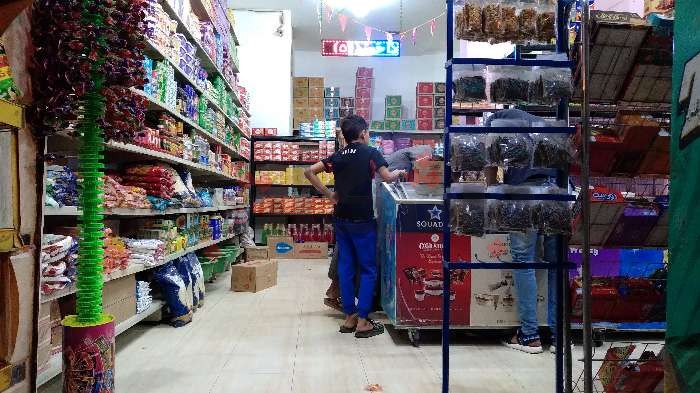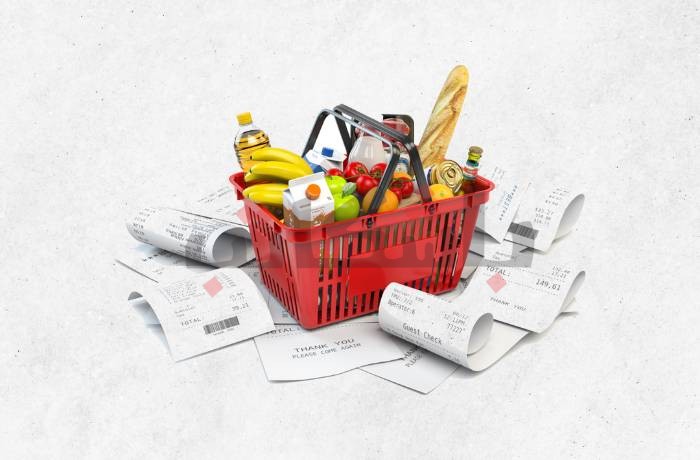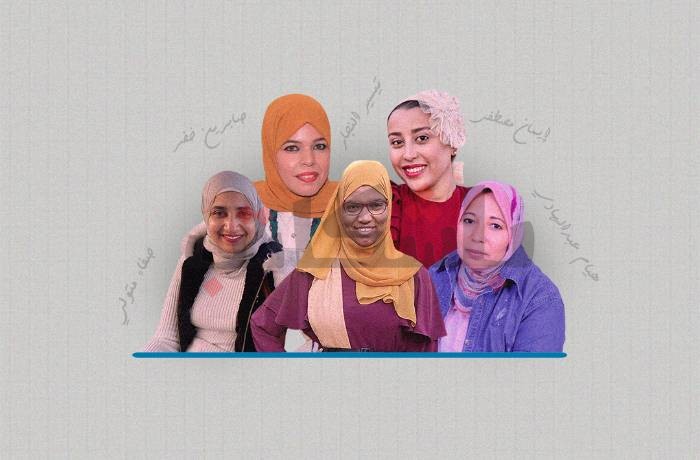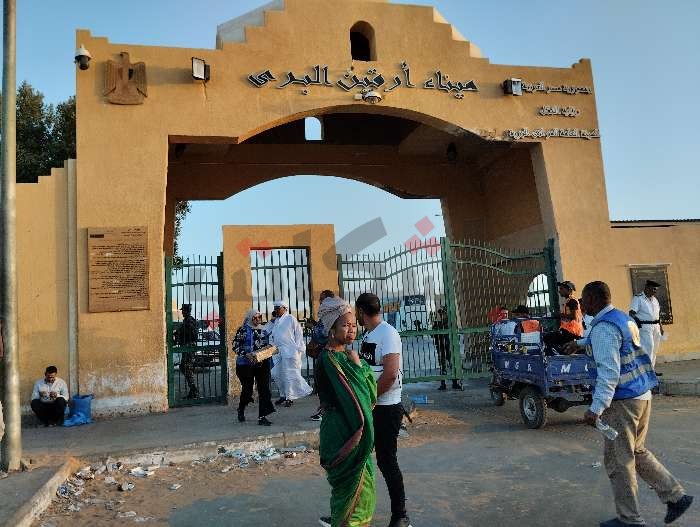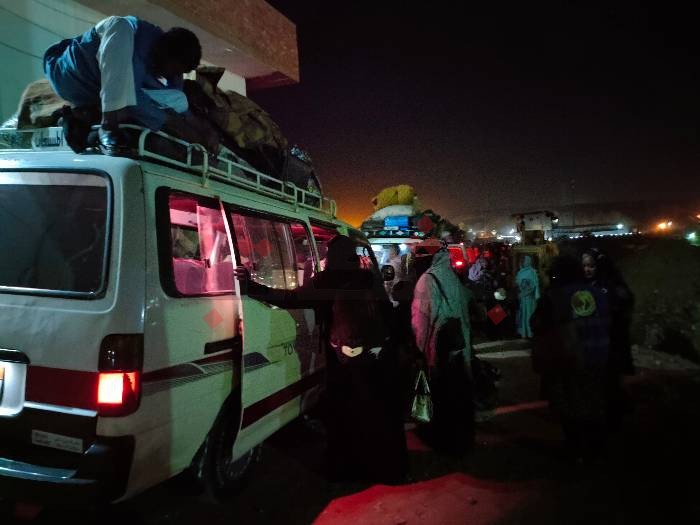From Khartoum, the capital of Sudan, to Aswan; Heba Salah, a Sudanese national, and her sister came to Egypt after an arduous journey that lasted days, fleeing the clashes and searching for a safe refuge, especially in light of the power and water cuts in most of the areas located in the vicinity of the fighting, in addition to the lack of food commodities and services in general, and finally the lack of fuel supplies.
Reaching Arqin crossing, Heba had to wait for hours on the platform of Aswan train station waiting for the train heading to Cairo, and from there she would go to Cairo Airport and then to Saudi Arabia where the rest of her family lives. This is how she told her story to “Ain Al-Aswani,” explaining that buying food and water during waiting hours did not form a financial obstacle, as the prices were lower than at the crossing, as the price of a bottle of mineral water reached 5 EGP, while its price at the crossing was the double.
The increase in food commodities and food prices in general is the talk of many people on social media platforms and in the streets; people’s fear takes two aspects, first was that stores would raise their prices taking advantage of the crisis, and second was that the conflict and receiving these large numbers of refugees in the city would cause the increase in the prices or shortage of commodities.
That’s why “Ain Al-Aswani” took a tour monitoring the prices before and after the start of the conflict and Egypt opening its crossing for the refugees, and how this is reflected on the Aswani streets, especially in the places where the Sudanese are centred.
The start was the vicinity of Aswan Train Station, which witnesses an increase in the numbers of people living around it, whether in the hotels or apartments or even in public areas, waiting for the train to take them to different destinations.
During the tour, we monitored the increasing demand on grocery stores and fast-food restaurants by the travellers, they didn’t witness an increase in the prices different from the old ones, for the prices increased recently not because of the conflict in Sudan, but because of the flotation of the Egyptian pound and the decline in value against the US dollar.
The same thing occurred in Abbas Al-Aqqad district where it received large numbers of Sudanese refugees who dwelled whether in hotels or apartments; prices didn’t change at large; they were the same as before the crisis.
“Commodities’ prices didn’t change before and after the crisis”, this is how one of the residents clarified about the area where the Sudanese reside to study or work there.
Al-Sail, a district where prices are the cheapest, has many different markets in Al-Sail Al-Reef and Al-Shader, “Ain Al-Aswani” monitored vegetables’ prices which ranged between 7 to 10 EGP, water bottles cost 3 EGP, and potatoes 10 EGP per kilogram.
Issues of prices and the crisis in Sudan got mixed together, as a lady who preferred not to mention her name said that she came to Egypt 4 days after the crisis escalated in Khartoum where water and electricity were cut off.
The lady preferred to reside temporarily in Aswan until the crisis was resolved in Sudan, she used to live in Abbas Al-Aqqad district after contacting a relative living there. She is waiting to move with her family to Cairo in an apartment she owns there, for this is the first time for her in Aswan after living in Cairo for some time as she owns shops there.
“I had a difficult time in Arqin Crossing, there were no amenities and prices were high; I paid 10 EGP for a bottle of water and 15 for a carton of juice, which is more expensive than in Abbas Al-Aqqad where my sister bought a chicken for 200 EGP and residents there told me it is the usual price”, the lady told “Ain Al-Aswani”.
It is worth mentioning that the prices in the outlets in Arqin border crossing are “tourist prices”, according to a previous visit by “Ain Al-Aswani” there.
Prices and services were not the only things occupying the lady’s mind, the fate of her son’s high-school exams in Sudan was on hold; the exams are next June, but they had to leave everything because of the conflicts and schools closing.
Abdel-Muttalib Othman, an employee at the Ministry of Finance in Khartoum, felt at home in Aswan; he used to stay in an apartment in Abbas Al-Aqqad district to celebrate the holidays with his children, who study in Aswan in a school that was now transformed into a place housing the Sudanese refugees.
However, Othman didn’t go to Aswan escaping the conflicts in his country, he reached the Egyptian governorate on his usual trip there only a day before the crisis started.
Othman now feels worried about his friends and relatives in Sudan who couldn’t flee to Aswan, their jobs and wait for payment kept them behind. He is not thinking about having a job in Aswan for he might not find one that can support him, he is just thinking and waiting for things to settle down in Sudan so he can go back home.
Being familiar with life in Aswan made Othman assure us that the prices didn’t change after the crisis, “I go to the market to buy sugar for example, and it costs 20 EGP the same as before”.
Ahmed Mahmoud, who works in constructing bridges in Khartoum, confirms that commodities and vegetables’ prices didn’t change in Al-Sail district, and that he too used to go to Aswan for his brother's treatment, and he remembers losing his uncle in the explosion of his house.
Mahmoud describes the difficult hours he suffered before bringing his wife and children to the safety of Aswan, it took them 5 days to reach there. His fate is still unknown as he doesn’t know how things will work in his job, especially as he didn’t expect the conflict to escalate and he couldn’t withdraw his money from the bank in Sudan.
Initiatives by associations, parties, and individuals are trying to provide assistance to the Sudanese to alleviate their hardships, such as distributing meals to them during the journey to Aswan, and also in the residential areas in which they stayed after arrival, in addition to travellers waiting in front of Aswan train station for train tickets to take them to their next destination.
“Ain Al-Aswani” monitored the transformation of the vicinity of Aswan train station into an arrival destination for buses and cars coming from the border crossings between Egypt and Sudan.
Qasem Al-Abadi, secretary of the Homat Watan Party in Aswan, told “Ain Al-Aswani” that the party provides free transportation to families coming from Sudan to move them from Arqin Crossing to Aswan, distributing water and canned meals, as well as trying to help them find places they can stay in whether in hotels or apartments in the city.
Most of those received by the Homat Watan Party saw Aswan as a temporary “transit” arrival station, in preparation to travel to Cairo or abroad, this is how Al-Abadi explains the situation.
Al-Abadi concluded the refugees’ complaints during the few days they resided in Aswan, that people took advantage of the crisis to increase the transportation and rents prices, but they didn’t complain about the prices of different commodities.
